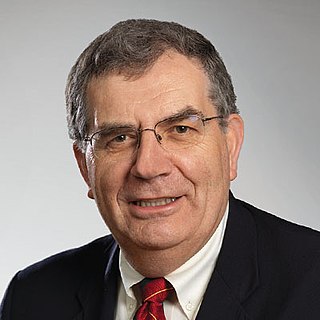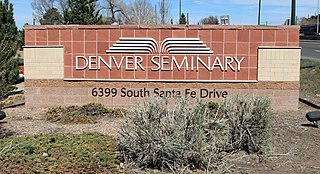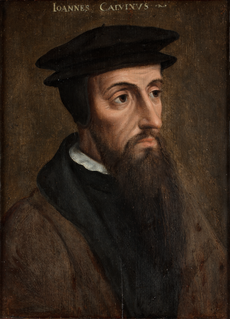Related Research Articles

Christian fundamentalism, also known as fundamental Christianity or fundamentalist Christianity, is a religious movement emphasizing biblical literalism. In its modern form, it began in the late 19th and early 20th centuries among British and American Protestants as a reaction to theological liberalism and cultural modernism. Fundamentalists argued that 19th-century modernist theologians had misinterpreted or rejected certain doctrines, especially biblical inerrancy, which they considered the fundamentals of the Christian faith.

The Presbyterian Church in America (PCA) is the second-largest Presbyterian church body, behind the Presbyterian Church (USA), and the largest conservative Calvinist denomination in the United States. The PCA is Reformed in theology and presbyterian in government. It is characterized by a blend of Calvinist practice and broad evangelicalism.

Westminster Theological Seminary is a theological seminary in the Reformed theological tradition in Glenside, Pennsylvania. It was founded by members of the faculty of Princeton Theological Seminary in 1929 after Princeton chose to take a liberal direction during the Fundamentalist–Modernist controversy.

John Gresham Machen was an American Presbyterian New Testament scholar and educator in the early 20th century. He was the Professor of New Testament at Princeton Seminary between 1906 and 1929, and led a conservative revolt against modernist theology at Princeton and formed Westminster Theological Seminary as a more orthodox alternative. As the Northern Presbyterian Church continued to reject conservative attempts to enforce faithfulness to the Westminster Confession, Machen led a small group of conservatives out of the church to form the Orthodox Presbyterian Church. When the northern Presbyterian church (PCUSA) rejected his arguments during the mid-1920s and decided to reorganize Princeton Seminary to create a liberal school, Machen took the lead in founding Westminster Seminary in Philadelphia (1929) where he taught New Testament until his death. His continued opposition during the 1930s to liberalism in his denomination's foreign missions agencies led to the creation of a new organization, the Independent Board for Presbyterian Foreign Missions (1933). The trial, conviction and suspension from the ministry of Independent Board members, including Machen, in 1935 and 1936 provided the rationale for the formation in 1936 of the OPC.
The Orthodox Presbyterian Church (OPC) is a confessional Presbyterian denomination located primarily in the northern United States. It was founded by conservative members of the Presbyterian Church in the United States of America (PCUSA) who strongly objected to the Modernist theology during the 1930s. It has had an influence on evangelicalism far beyond its size.

Princeton Theological Seminary (PTSem), officially The Theological Seminary of the Presbyterian Church, is a private school of theology in Princeton, New Jersey. Founded in 1812 under the auspices of Archibald Alexander, the General Assembly of the Presbyterian Church (USA), and the College of New Jersey, it is the second-oldest seminary in the United States. It is also the largest of ten seminaries associated with the Presbyterian Church.
Reformed Theological Seminary (RTS) is a theological seminary in the Reformed theological tradition with campuses in multiple locations in the United States. Founded by conservatives in the Southern Presbyterian Church, the Presbyterian Church in the United States, in 1966, it serves primarily students from more conservative branches of the Presbyterian and Reformed traditions.

The Presbyterian Church in the United States of America (PCUSA) was the first national Presbyterian denomination in the United States, existing from 1789 to 1958. In that year, the PCUSA merged with the United Presbyterian Church of North America, a denomination with roots in the Seceder and Covenanter traditions of Presbyterianism. The new church was named the United Presbyterian Church in the United States of America. It was a predecessor to the contemporary Presbyterian Church (USA).

Francis Landey Patton was a Bermudan-American educator, Presbyterian minister, academic administrator, and theologian, and served as the twelfth president of Princeton University.

Sinclair Buchanan Ferguson is a Scottish theologian known in Reformed Christian circles for his teaching, writing, and editorial work. He is Chancellor's Professor of Systematic Theology at Reformed Theological Seminary since 2017, commuting from Scotland where he is an assistant minister at St. Peter's Free Church of Scotland, Dundee.

Covenant Theological Seminary, sometimes known as Covenant Seminary, is the denominational seminary of the Presbyterian Church in America (PCA) and it is located in Creve Coeur, Missouri. Covenant trains leaders for work in the church and the world — especially as pastors, missionaries, and counselors. It does not require all students to be members of the PCA, but it is bound to promote the teachings of its denomination. Faculty must subscribe to the system of biblical doctrine outlined in the Westminster Standards.
Harold John Ockenga was a leading figure of mid-20th-century American Evangelicalism, part of the reform movement known as "Neo-Evangelicalism". A Congregational minister, Ockenga served for many years as pastor of Park Street Church in Boston, Massachusetts. He was also a prolific author on biblical, theological, and devotional topics. Ockenga helped to found the Fuller Theological Seminary and Gordon-Conwell Theological Seminary, as well as the National Association of Evangelicals (NAE).

The Fundamentalist–Modernist controversy is a major schism that originated in the 1920s and '30s within the Presbyterian Church in the United States of America. At issue were foundational disputes about the role of Christianity, the authority of Scripture, the death, Resurrection, and atoning sacrifice of Jesus. Two broad factions within Protestantism emerged: Fundamentalists, who insisted upon the timeless validity of each doctrine of Christian orthodoxy, and Modernists, who advocated a conscious adaptation of religion in response to the new scientific discoveries and the moral pressures of the age. At first, the schism was limited to Reformed Protestantism (Calvinism) and centered about the Princeton Theological Seminary which has split into Westminster Theological Seminary, but it soon spread, affecting nearly every Protestant denomination in the United States. Denominations that were not initially affected, such as the Lutheran Church, eventually were embroiled in the controversy, leading to a schism in the Lutheran Church.
Clarence Edward Noble McCartney was a prominent conservative Presbyterian pastor and author. With J. Gresham Machen, he was one of the main leaders of the conservatives during the Fundamentalist–Modernist Controversy in the Presbyterian Church in the United States of America.

Denver Seminary is a private, Evangelical Christian seminary with its main campus in Littleton, Colorado, an online global campus, and an extension campus in Washington, DC. It offers Master of Arts (MA), Master of Divinity (M.Div.), Doctor of Ministry (D.Min.), and Master of Theology (MTS) degrees and has enrollment of more than 900 students. Denver Seminary adheres to the National Association of Evangelicals Statement of Faith.
Allan Alexander MacRae was an evangelical Christian scholar who, with Harold S. Laird, Carl McIntire, Roland K. Armes, and several other conservative Presbyterians, helped found Faith Theological Seminary and, with Jack Murray, Biblical Theological Seminary. Because of his longevity, MacRae engaged in both the battles of the fundamentalist-modernist controversy and with the rise of Neo-evangelicalism in mid-20th century America, playing important roles in the establishment of three conservative American seminaries.
James Oliver Buswell, Jr. was a Presbyterian theologian, educator and institution builder.
Charles Jahleel Woodbridge was an American Presbyterian missionary, minister, seminary professor, founding member of the National Association of Evangelicals, and author of The New Evangelicalism.

Presbyterianism has had a presence in the United States since colonial times and has exerted an important influence over broader American religion and culture.

P&R Publishing is an evangelical, Reformed, Christian publishing company located in Phillipsburg, New Jersey. P&R publishes books that promote biblical concepts and Christian lifestyle according to the Westminster Confession of Faith and Catechisms.
References
- ↑ Westminster Seminary in Texas becomes Redeemer Seminary in Dallas February 25, 2009 The Aquila Report
- ↑ Redeemer Theological Seminary, Dallas, Granted Accreditation by the Association of Theological Schools September 26, 2013 The Aquila Report
- ↑ Bradley J. Gundlach, Process and Providence: The Evolution Question at Princeton 1845-1929, (Wm. B. Eerdmans Publishing, 2013) pg. 11
- ↑ Redeemer Seminary, the Fundamentalist-Modernist Controversy, and the Parachurching of Reformed Theological Education
- ↑ Westminster II
- ↑ Who We Are – The Missional Training Center
- ↑ "Faculty | Redeemer Seminary". www.redeemerseminary.org. Archived from the original on 2012-04-10.
- ↑ "Reformed Theological Seminary to Continue Redeemer Legacy — Redeemer". Archived from the original on 2017-09-25.
- ↑ "About | Paul Tripp".